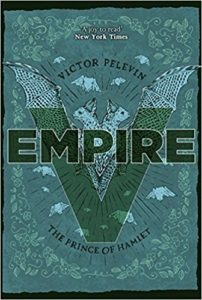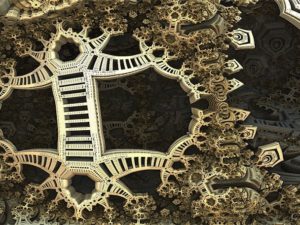
By Vajra Chandrasekera
Empire V — Victor Pelevin (Gollancz)
 Empire V is about vampires, which is probably guaranteed to turn away many readers who could happily go the rest of their lives without seeing another vampire. The figure of the vampire has by this point been made to stand in for so many disparate things—the sexual predator, the romantic outsider, the lonely immortal, the feral beast, whatever—that the image feels quite emptied of meaning in itself. Merely knowing that there are vampires in a story no longer tells us anything useful about it. At best, one might make two safe guesses: one, that the story is not going to be about vampirism as such; two, that the vampires will be in some way a fringe element to society.
Empire V is about vampires, which is probably guaranteed to turn away many readers who could happily go the rest of their lives without seeing another vampire. The figure of the vampire has by this point been made to stand in for so many disparate things—the sexual predator, the romantic outsider, the lonely immortal, the feral beast, whatever—that the image feels quite emptied of meaning in itself. Merely knowing that there are vampires in a story no longer tells us anything useful about it. At best, one might make two safe guesses: one, that the story is not going to be about vampirism as such; two, that the vampires will be in some way a fringe element to society.
The first of those is largely because the vampire as a figure of fear seems dated; it’s rarely played that straight any more except in apocalyptic scenarios like The Passage or The Strain, or perhaps in retellings like The Historian. In stories with a contemporary, non-apocalyptic setting, the vampire as a romantic sympathetic figure is of course more common. It exploits a convenient otherness, especially if the tiresome biteyness can be toned down—the heroic vampire happens to be “half human” and/or has a “soul” and/or is vegetarian and/or has a plentiful supply of ethically sourced blood, or any other device that allows the story to be about something other than the vampirism per se.
The second safe guess, meanwhile, is what generally unites the use of the image across styles and tones: in a non-apocalyptic scenario, vampires must necessarily be a hidden or otherwise fringe element. They might be secret sybarites living in luxury like in Blade or Underworld, romantic feral loners like in Let The Right One In, comedic suburban left-behinds like in What We Do In The Shadows, or if their existence is widely known, they might even (bizarrely) be an oppressed minority like in the Sookie Stackhouse books. In all of these variations, the vampire is marginal to human civilization, which is still (if only by virtue of numbers) the dominant power. At most, they’re a hidden secret society that might farm small communities of humans, like in Fledgling or Carrion Comfort.
Pelevin’s Empire V is entertaining precisely to the extent that it flouts these two safe guesses. First, the entire book is specifically about the act of vampirism and what exactly it is that’s being sucked, which is no longer blood but money, or rather the human mental processes and anxieties of desire and frustration that money represents; second, its vampires are not marginalized in any way, but are rather the designers and creators of humans both as a species and as a society: humans were bred to have a mind that would desire things, and then given a society engineered to both continually provoke that desire and frustrate it.
As a critique of capitalism, this is perhaps a little too over-the-top to work except as comedy, so of course Empire V hams it up from the very beginning. The protagonist is a hapless and unpleasant young man who is turned by a vampire at the outset and spends the rest of the book being indoctrinated into vampire society, which is (naturally) full of terrible people. Early on, he learns that the actual vampires are a slug-like symbiont (called the Tongue, because it replaces the tongue of a human host): these are creatures who once fed on dinosaurs, and who ensured that mammals and then humans were bred to be compatible for symbiosis.
‘For a long period we lived in large predators, such as the sabre-toothed tiger and other big cats. Our culture was at that time, well … ah … somewhat alarming. Heroic and violent, you might say. We were terrible, magnificent and cruel. But you cannot be magnificent and cruel for ever, and approximately half a million years ago there was a kind of a revolution in the world of vampires …’
The term ‘revolution’ had frequently cropped up in Discourse, and could apparently mean almost anything you wanted it to. I thought of the most recent contexts in which I could remember it being used.
‘Do you mean something like the Orange Revolution in Kiev? Or something more like the Volvo Revolution?’
‘Hmm,’ said Enlil Maratovich uncertainly, ‘not quite. It was more akin to a religious conversion. As I mentioned, vampires set themselves the task of changing over from stock-raising to a form of dairy husbandry. They decided to create a milch animal for their needs. The result was the appearance of mankind.’
This is pretty typical of Empire‘s prose: both the sly humour and the way people talk at the protagonist, Rama, who is continually frustrated by his inability to understand vampire ideology and continually insecure about his low position in their hierarchy and his inability to assimilate. Eventually it turns out he’s not a unusually bad learner, nor is vampire pedagogy fundamentally unsound—his education was half-assed because he was earmarked for a social/sacrificial role that he was not expected to survive. But that’s not particularly important. Plot and denouement are not what this book is about. This book is about the pleasure of lazily exploring the metaphor’s odd corners, as if deliberately setting itself in opposition to stories that take the vampire and all its associated tropes as givens.
Vampires, of course, have a stake in every speculative genre. From their roots in horror and the weird to their more defanged cousins in fantasy, they vary more in the affect they are intended to evoke rather than in the plausibility of the explanations for their existence. The most science-fictional vampires, like in Fledgling or Blindsight, are the ones that break the fewest realisms. Unlike the monstrous vampire who is an aberration of nature, or the friendly neighbourhood Vincent the Vegetable Vampire who is fully assimilated into the narrative’s normal, the most sfnal vampire stories are the ones that worry about explanations (where do vampires come from? How do they work? What do they want?) and attempt to answer these questions in material terms. The peculiar pleasure of Empire V is just how much space it devotes to this at the expense of a more conventional plot.
That’s not to say that there isn’t a conventional plot: there is indeed a faux-romance and a rivalry, culminating in a vampire duel. But in keeping with Empire‘s absurdist tone, the duel is fought with poems, which inevitably leads into a discussion of the formal requirements of the vampiric sonnet, which may well be my favourite passage in the whole book.
‘So, according to the rules of the engagement you and your rival must each compose a poem. The form of the poem must be a vampiric sonnet.’
‘What is that?’ I asked.
Loki looked enquiringly at Baldur.
‘Did we not tell you?’ groaned Baldur. ‘What an omission. A vampiric sonnet is a poem consisting of twelve lines. Rhyme and metre, if any, are optional. The most important thing is that the last line must metaphorically suck, so to say, all the meaning out of the poem, expressing and encapsulating with maximum brevity the quintessence of the verse. The last line thus symbolises the process whereby red liquid is sublimated into bablos, which you then ritually present to the Mosquito Muse. Understand?’
‘Approximately,’ I said.
‘But this is a lyric poetry convention, not a strict rule,’ continued Baldur. ‘Each poet can decide for himself the manner in which he proposes to convey the sense of the whole poem in a single line. After all, only the author knows what it is, is that not so?’
Loki nodded importantly.
‘There’s one other rule for the vampiric sonnet – it should be written as a reverse stairway. The result is a kind of ladder of meanings, symbolising the vampire’s descent to the lowest essence. But actually that’s not obligatory either.’
‘What do you mean by a reverse stairway? What would it look like?’
‘Like Mayakovsky,’ said Baldur. ‘Only backwards.’
Having been told that humans were bred for milking, Rama (an assumed name, like Loki and Baldur and the rest: all vampires name themselves after human gods when they enter into symbiosis with a Tongue, as a kind of affectation. Among the many hierarchies of vampire society is that technically the human bodies and minds of the vampires themselves, no matter their seniority, are entirely subservient to the Tongue, which is simultaneously the organ through which they imbibe raw exploitation and the one through which they discourse about it) spends much of the book trying to understand, as he puts it, the “milking mechanism”. He’s seen Blade: Trinity so he wonders whether there are shrink-wrapped humans being bled in secret laboratories. When he learns that it’s about money, not blood, at first he interprets that in the most literal possible way, assuming that used paper currency is somehow liquefied into something vampires can drink. But it’s simpler than that. Empire V’s vampires don’t ambush people in dark alleys and bite them or gnaw on their wallets. Instead, they feed remotely on bablos, rarefied human desire; that is, they consume the emotional labour performed by the human mind. (To the vampire, this is the original purpose of human minds and everything else is merely byproduct.) Of course, this is not a new metaphor, but a return to one of the oldest. To Marx, capital was dead labour that, “vampire-like, only lives by sucking living labour”—a device literalized in Empire, if broadened somewhat in scope.
The monstrous vampire is usually a particular predator (sometimes a plague of infection, though this is usually zombies or aliens, but mostly individual bad vampires with their own personalities, or at least aesthetics); meanwhile, the prevalent reimagining of the vampire as tortured antihero or even just regular romantic hero (presumably paralleling the reactionary politics of the last forty years) is also usually about particular vampires, focusing intensely on their personal struggles and individual characters. Empire avoids both of those approaches by being very much about vampires as a ruling class, not as individuals. This is underscored by how little their human selves or personalities seem to matter to the Tongues: Rama appears to be selected as a host more or less at random. None of the vampires are interestingly tortured, or even conflicted; rather, new vampires are quickly seduced by wealth and privilege, and completely submerged in a bubble of ideological reinforcement. The eventual revelation and consumption of the bablos is experienced by Rama as euphoric rather than horrific. Tellingly, an older vampire remarks that consumption of bablos is actually traumatic and painful for the human hosts, but that the Tongue then conditions them by releasing neurotransmitters to retroactively believe that the pain was in fact superhuman happiness and pleasure.
I was no exception. I could remember this bright-red germ of hope growing in me … We imagine we are just on the point of understanding something important, of figuring it all out at last, of achieving something, after which a new life will begin, the right life, the real life. But this never happens because the red drop of sense and hope always vanishes, and we must begin again to grow it and nurture it from nothing. And then it disappears once again, and so it goes on throughout our life, while we become more and more tired until finally nothing is left to us but to lie on our beds, turn our faces to the wall, and die …
Now I knew what invariably happens to the red drop of hope. I fell ever more quickly through other lives as my rider was deftly scooping up the last remaining drops of meaning, swallowing them as it sated its inscrutable hunger. Many people I saw were on the brink of understanding what was happening, they guessed it but were incapable of thinking about it. […] In the last second of the voyage I remembered that all of this had been familiar to me when I was a child. Then I had seen vampires flying through my dreams and knew that they were taking from me the most important thing in life. But in the real world it is forbidden for humans to know what they can know in dreams.
The individual vampires in Empire are clownishly malevolent. Not a one of them is a leathery badass or dark mastermind. While the totalizing system of vampiric exploitation is indeed sinister and horrific, the particular vampires who we see benefit from it are as foolish, venal, petty, self-satisfied, and unsexily dangerous as any President or CEO. Arguably this might make the book too realistic to be considered science fiction, but for what it’s worth they do turn into giant bats sometimes.
*
Vajra Chandrasekera is a writer from Colombo, Sri Lanka, and a fiction editor at Strange Horizons. His short fiction has appeared in Black Static, Clarkesworld, and Lightspeed, among others. He blogs occasionally at vajra.me and can be found on Twitter at @_vajra.
>> Read Vajra’s introduction and shortlist.
1 Comment
-
I’ve been a fan of Pelevin’s work since I came across the irresistibly-titled A Werewolf Problem in Central Russia in a bookstore in what must have been the late 90s. His novels are certainly unique; I can’t think of anyone else who matches his blend of philosophy, history, and satire. I’m not sure that any of the subsequent ones have been executed quite as effectively as his first, Omon Ra, although I thought Homo Zapiens was close. I think his best work is probably at shorter lengths; The Yellow Arrow is a masterpiece. ( I haven’t yet caught up with his previous novel, S.N.U.F.F..) Still, the novels are always wildly inventive rides, and this sounds eminently worth reading. I’m not sure why he doesn’t have a North American publisher any longer.


